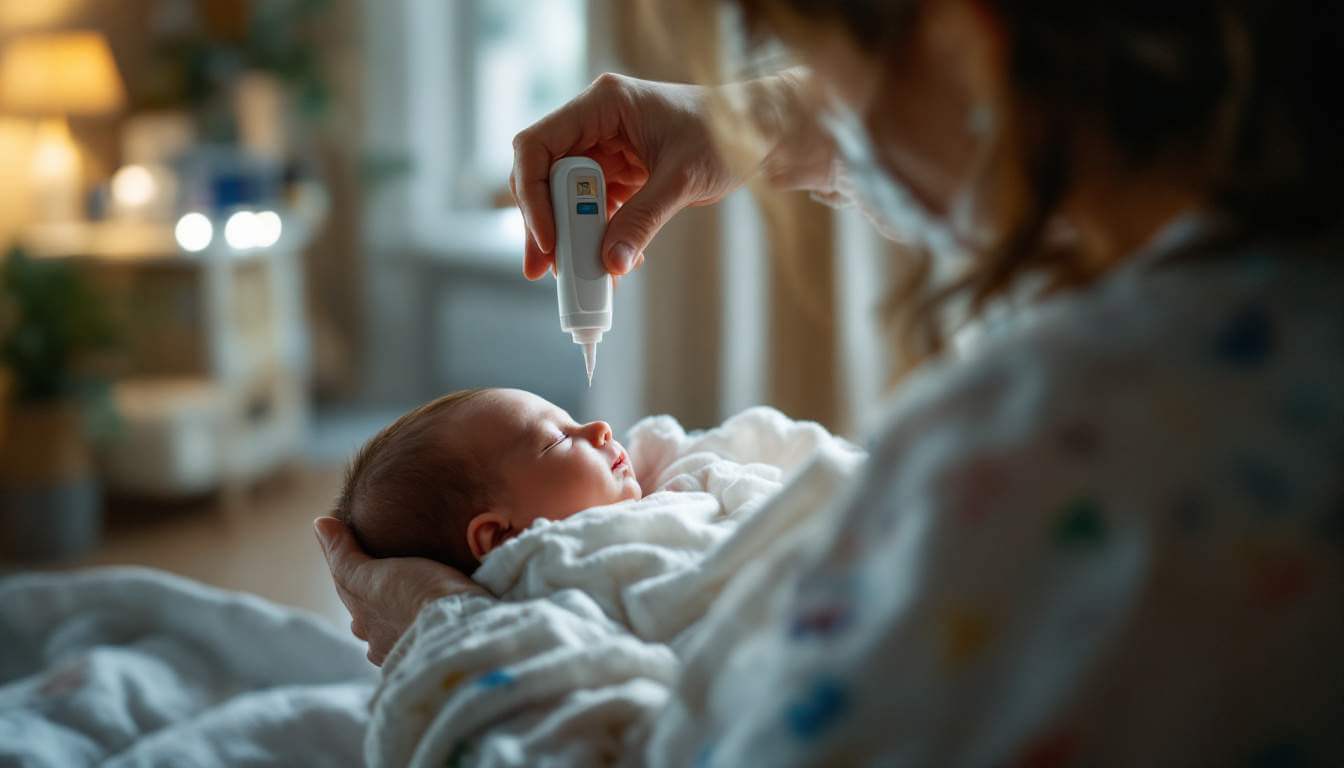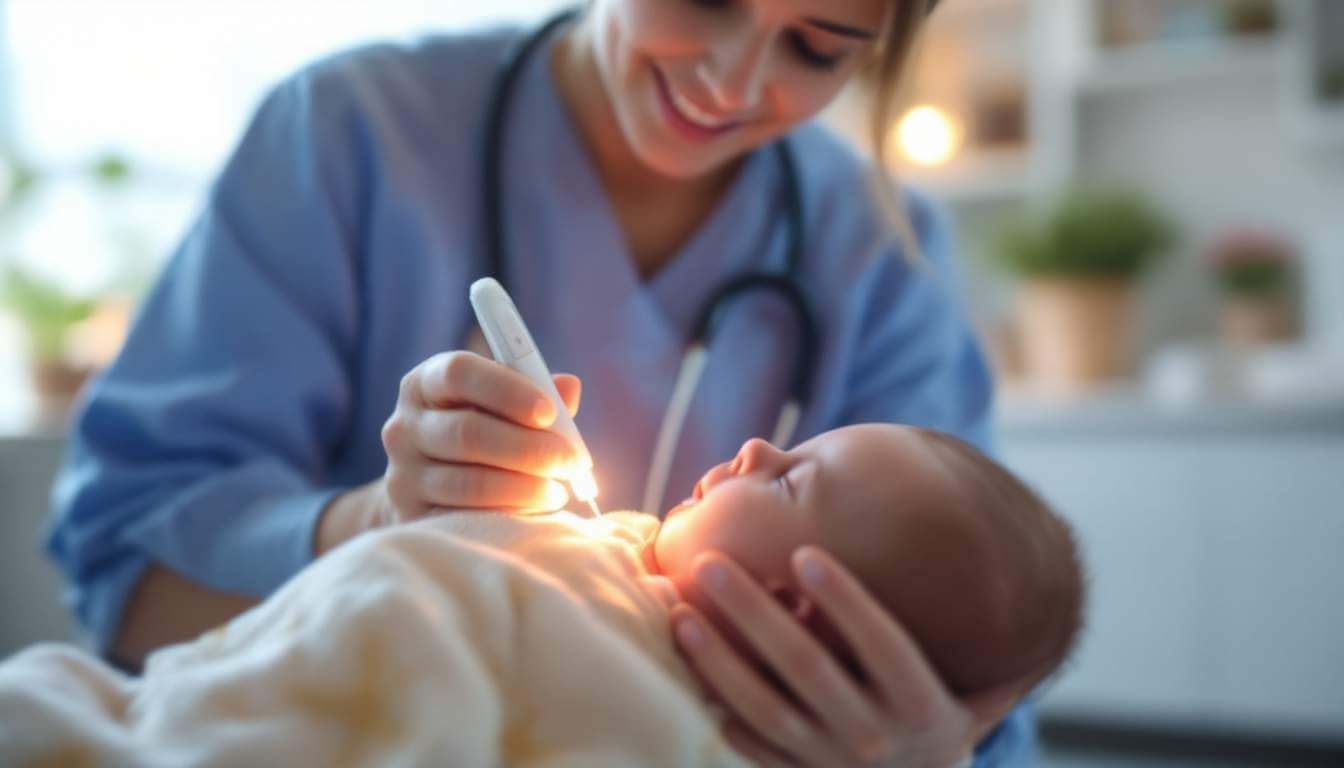Table of Contents
Newborn screening is a vital healthcare process designed to identify certain genetic, metabolic, hormonal, and functional conditions in newborns before symptoms begin to appear. This comprehensive guide will explore the significance of newborn screening in New Jersey, outlining the procedures, types of screenings, result interpretation, and the legal framework surrounding them. Understanding these elements is crucial for parents, healthcare providers, and policymakers alike.
Understanding the Importance of Newborn Screening
Newborn screening has become an indispensable component of preventive healthcare. Through early detection of conditions that can lead to significant health complications, it saves lives and enhances the quality of life for infants. This section delves into the essential purposes and benefits of such screenings.
The Purpose of Newborn Screening
The primary purpose of newborn screening is to identify serious health conditions that may not be immediately apparent at birth. By testing for specific congenital or inherited disorders, healthcare providers can intervene promptly, leading to better outcomes.
Most conditions detected through newborn screening are serious but treatable if found early. For instance, metabolic disorders like phenylketonuria (PKU) can lead to intellectual disabilities if left untreated, but dietary management initiated through early screening can prevent these consequences. Additionally, conditions such as cystic fibrosis, which affects the lungs and digestive system, can be managed effectively when diagnosed early, allowing children to lead healthier lives with fewer complications.
Benefits of Early Detection
Early detection through newborn screening yields numerous benefits. Primarily, it allows for timely interventions that can mitigate the severity of health issues. For example, infants diagnosed early with congenital hypothyroidism can receive thyroid hormone replacements that support normal growth and development.
Moreover, newborn screening fosters peace of mind for parents. Knowing that their child has been tested for critical disorders can alleviate worries about potential health challenges that may arise in the future. These screenings contribute to reduced healthcare costs over time, preventing the need for more complex medical interventions later on. Furthermore, the implementation of newborn screening programs has led to significant advancements in public health, as they not only identify affected infants but also provide valuable data that can inform research and improve treatment protocols for various conditions. This proactive approach to healthcare underscores the vital role of early detection in shaping healthier generations.
The Newborn Screening Process in New Jersey
In New Jersey, the newborn screening process is a systematic procedure that occurs shortly after birth. This section outlines the timing and location of the screenings as well as who is responsible for conducting them.
When and Where is the Screening Done?
Newborn screenings in New Jersey typically occur before the baby is discharged from the hospital, usually within the first 24 to 48 hours of life. The screenings are performed in hospitals and birthing centers throughout the state. Parents can expect a small blood sample to be collected via a heel prick.
This process is quick and relatively painless and is often done as part of routine care. If the newborn is born at home or in a setting without immediate access to screening tests, follow-up appointments should be scheduled to ensure proper testing occurs shortly after birth. New Jersey's commitment to newborn health ensures that even those born outside traditional settings receive the necessary screenings, thereby safeguarding their health from the very beginning.
Who Conducts the Screening?
The screening is usually performed by trained healthcare professionals, such as nurses or medical technicians. They follow established protocols to collect blood samples and send them to designated laboratories for analysis.
In addition, pediatricians and family physicians play an essential role in following up on the results and discussing them with parents. They are responsible for guiding families through potential next steps if any anomalies or concerns arise from the screening results. This collaborative approach ensures that parents are not only informed but also supported throughout the process, allowing them to make educated decisions regarding their newborn's health. Furthermore, healthcare providers are trained to provide emotional support and resources to families, recognizing that receiving unexpected results can be overwhelming. The emphasis on communication and care is a cornerstone of the newborn screening process in New Jersey, fostering a sense of trust and partnership between families and healthcare professionals.
Types of Newborn Screenings in New Jersey
In New Jersey, several types of screenings are mandated to ensure the health and safety of newborns. This section will examine the significance of metabolic disorder screening, hearing loss screening, and critical congenital heart disease (CCHD) screening.
Metabolic Disorder Screening
Metabolic disorder screening involves testing for a variety of genetic disorders that can hinder proper metabolism. Common conditions screened include phenylketonuria (PKU), sickle cell disease, and cystic fibrosis.
Identifying these disorders early allows for immediate treatment interventions such as dietary modifications or enzyme replacement therapies, significantly enhancing the newborn's quality of life. For instance, infants diagnosed with PKU must adhere to a strict low-phenylalanine diet to prevent cognitive impairment, while those with cystic fibrosis may require specialized respiratory therapies and nutritional support to manage their condition effectively. The comprehensive nature of metabolic disorder screening not only aids in the early detection of these conditions but also empowers families with the knowledge and resources needed to navigate the complexities of managing these lifelong health challenges.
Hearing Loss Screening
Hearing loss screening is crucial in identifying infants who may require additional assessments or interventions to address potential hearing impairments. It is typically performed using automated auditory brainstem response (AABR) tests or otoacoustic emissions (OAE) tests.
Early detection of hearing loss enables timely support services, such as hearing aids or cochlear implants, along with early intervention programs that improve communication skills and social development. The importance of these screenings cannot be overstated, as untreated hearing loss can lead to delays in speech and language development, impacting a child's ability to learn and socialize. Furthermore, New Jersey's commitment to follow-up care ensures that families receive the necessary guidance and resources to support their child's auditory and developmental needs, fostering an environment where every child has the opportunity to thrive.
Critical Congenital Heart Disease (CCHD) Screening
Critical congenital heart disease screening involves a pulse oximetry test that measures oxygen levels in a newborn's blood to detect potential heart defects. These conditions can be life-threatening if not identified and treated promptly.
Early intervention through appropriate medical care can drastically improve survival rates and reduce complications associated with congenital heart defects. Consequently, this screening is essential in ensuring the well-being of newborns. Beyond the immediate medical interventions, families are often provided with comprehensive educational resources to help them understand the nature of the heart defect and the necessary follow-up care. This holistic approach not only addresses the physical health of the newborn but also supports the emotional and psychological needs of the family as they navigate the complexities of congenital heart disease management, reinforcing the importance of community support and healthcare collaboration in the journey ahead.
Interpreting the Results of Newborn Screening
Upon completion of newborn screening tests, parents receive results that require careful interpretation. Understanding these results ensures that parents and healthcare providers can make informed decisions moving forward.
Understanding Positive Results
A positive result indicates that further testing may be needed to confirm a diagnosis. It is important to note that a positive screening does not necessarily mean that the newborn has a condition; it simply requires additional evaluation.
In the case of positive results, healthcare providers will typically arrange for more comprehensive tests and provide parents with clear guidance on the next steps. Continuous support and communication are crucial throughout this process.
What Negative Results Mean
Negative results in newborn screening indicate that no significant conditions were detected. This outcome is reassuring for parents, but it is important to remember that no screening test is entirely foolproof.
Healthcare providers will often discuss the importance of continued follow-ups and monitoring, as some conditions may develop later or may not have been included in the screening panel. Parents are encouraged to maintain regular check-ups and stay vigilant regarding their child's development.
Legal Aspects of Newborn Screening in New Jersey
The legal framework surrounding newborn screening in New Jersey establishes guidelines for consent, privacy, and the obligations of healthcare providers. Understanding these legal aspects ensures that screenings are carried out ethically and in compliance with state and federal regulations.
Consent and Privacy Laws
Consent is a fundamental element of newborn screening. In New Jersey, healthcare providers must obtain informed consent from parents or guardians before conducting screenings. This process includes providing information about the tests, their purposes, and potential implications for the newborn's health.
Moreover, privacy laws safeguard the sensitive information obtained during the screenings. New Jersey complies with HIPAA regulations, ensuring that personal and medical information is kept confidential and shared only with authorized individuals.
Mandatory vs Optional Screenings
New Jersey mandates certain screenings as part of the newborn care process, such as metabolic disorder screening and CCHD screening. However, some screenings may be optional, depending on specific risk factors or family medical history.
Parents should be informed about the importance of both mandatory and optional screenings, enabling them to make educated choices regarding their child's health. Comprehensive discussions with healthcare providers can help families navigate these decisions effectively.
In summary, newborn screening is a critical aspect of infant healthcare in New Jersey, offering significant benefits through early detection and intervention. By staying informed about the process, types of screenings, result interpretations, and legal requirements, parents can ensure their newborns receive the best possible start in life.






